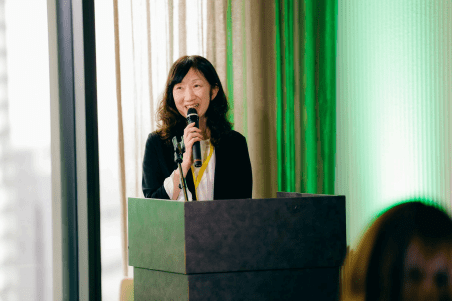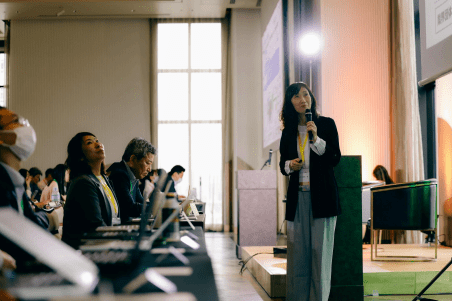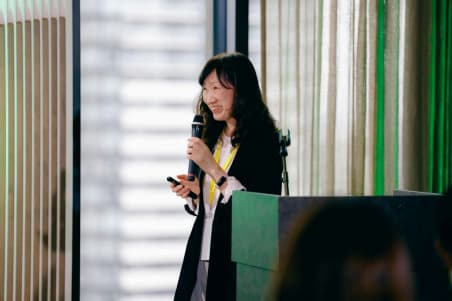
Yuri Ishinaka, Manager, Sustainability Promotion Department, Asahi Kasei Corporation
Asahi Kasei is a comprehensive chemical manufacturer with a history spanning over a
century. Centered on three key sectors—materials, housing, and healthcare—the company
has continually adapted to meet diverse societal needs, solidifying its reputation as one of
Japan’s leading enterprises. In fiscal year 2023, Asahi Kasei recorded revenue of ¥2.7849
trillion (approximately €17.456 billion), with over half of its sales derived from international
markets, underscoring its strong global presence.
Leveraging its expansive global network, Asahi Kasei aims to implement efficient and
actionable sustainability initiatives. In 2023, the company implemented the EcoVadis
Corporate Plan to initiate concrete efforts across its group operations. This article explores
Asahi Kasei’s approach to achieving supply chain sustainability, as presented by Yuri
Ishinaka, Manager of the Sustainability Strategy Department, at the EcoVadis World Tour
Japan 2024 event held on October 25, 2024.
Pursuing Two Key Pillars of Sustainability
Asahi Kasei has expanded its business domains to align with societal changes, transitioning
from its roots in the textile industry to becoming a diversified chemical manufacturer in the
1970s. The company has since ventured into housing, electronics, and healthcare,
accelerating globalization through strategic acquisitions of overseas companies in the 2000s.
From its inception, the company has upheld its mission: "Contributing to life and living" of
people around the world. “To achieve this mission, we share the values of sincerity,
challenge and creativity across all employees, pursuing two key pillars: contributing to a
sustainable society and enhancing corporate value sustainably,” explains Ishinaka. These
principles form the foundation of Asahi Kasei’s sustainability-driven business strategies.
Asahi Kasei Group’s Commitment to Sustainability
Asahi Kasei has established clear targets to reduce greenhouse gas (GHG) emissions by
over 30% by 2030 (compared to 2013 levels) and to achieve carbon neutrality by 2050. To
meet these goals, the company is implementing measures such as decarbonizing in-house
power generation, sourcing non-fossil electricity, and improving manufacturing processes.
It is also developing innovative technologies, including the commercialization of alkaline
water electrolysis systems for hydrogen production, adopting sustainable energy for
electricity and steam, and process reform. Asahi Kasei began developing alkaline water
electrolysis systems in 2010, aiming for commercial deployment by 2025. Pilot testing is
underway at its Kawasaki plant, with plans to position this technology as a key business
driver for achieving a decarbonized society. Additionally, the company is advancing the
practical use of bioethanol-based raw material production to reduce process-derived GHG
emissions.
Further initiatives include creating Environmental Contribution Products and building a
company-wide standard carbon footprint calculation system to help reduce GHG emissions.
The company also promotes circular economy practices, which encourages the efficient and
cyclical use of resources.
Building a Sustainable Supply Chain
With production, sales, and R&D facilities in approximately 20 countries, Asahi Kasei
leverages partnerships with trading companies and distributors to address diverse market
demands. Since 2023, the company has strengthened risk management within its business
groups, recognizing human rights as a critical issue. Specific measures include conducting
supplier sustainability questionnaires, revising its code of conduct, and enhancing logistics
efficiency through initiatives like shared transportation.
For supplier assessments, Asahi Kasei goes beyond by holding briefing sessions and
providing follow-up support, especially for suppliers with low scores. Following the revision of
its supplier code of conduct in September 2024, the company plans to request signed
agreements from major suppliers.
Regarding logistics, Asahi Kasei has adopted modal shifts to reduce CO2 emissions. For
example, it transitioned part of the transport route from Miyazaki Prefecture to Europe to a
direct shipping service via Kobe Port, reducing overland transport distances. This shift has
significantly lowered CO2 emissions while improving transport time, cost efficiency, and
customer satisfaction. Furthermore, ”Through our partnership with Mitsui Chemicals, the
company has optimized domestic long-haul transport by switching from trucks to ships and
implementing shared container use, reducing empty container trips and improving logistics
efficiency,” says Ishinaka. In addition to reducing CO2 emissions, these initiatives also
addressed the logistics issues of 2024.
Enhancing Transparency with the EcoVadis Assessment
Asahi Kasei began undergoing the EcoVadis assessment in 2011 and enhanced its
initiatives in 2019. “We established a system where headquarters provided the responses
while individual business divisions prepared the required documentation. However, with our diverse business operations, it was difficult to comprehensively monitor the progress of each assessment,” Ishinaka recalls.
To address these challenges, the company implemented the EcoVadis Corporate Plan in
2023. “With this plan, we can centrally manage assessment statuses across the group,
including overseas subsidiaries, via the dashboard, enabling more efficient and systematic
assessments,” explains Ishinaka. Moving forward, the company plans to leverage the plan to
review scorecard details, identify challenges, and develop corrective action plans.
By leveraging the EcoVadis assessment, changes in employee awareness are also
becoming evident across group companies. One notable example of success is Tongsuh
Petrochemical, a 100% subsidiary of Asahi Kasei based in Busan, South Korea. The
company is a leading manufacturer of acrylonitrile (AN)—a key material used in ABS resins
and acrylic fibers for home appliances—and became the first AN manufacturer in Asia to
obtain ISCC (International Sustainability & Carbon Certification) PLUS certification in 2022. It
has since begun producing AN using biomass-derived raw materials.
In response to customer requests, Tongsuh Petrochemical underwent its first EcoVadis
assessment in 2023. Although the initial year was spent extensively collecting information,
the following year saw the ESG team take the lead in developing guidelines and conducting
training sessions for relevant departments, resulting in the company earning a Gold Medal.
“Through this assessment process, employees gained a deeper understanding of the
significance of furthering sustainability initiatives, which led to a powerful shift in awareness,”
Ishinaka noted.
Moreover, there were cases where the results of EcoVadis assessments substituted for
customer audit requirements, further streamlining processes. Ishinaka emphasized,
“Undergoing EcoVadis assessments has become a critical initiative in advancing our
sustainability efforts,” highlighting its importance to the company’s broader strategy.
*Details about Tongsuh Petrochemical’s initiatives are featured in this article.

Future Outlook and Challenges for Asahi Kasei
Over the next three years, Asahi Kasei plans to expand group-wide participation in EcoVadis assessments using the Corporate Plan. “We aim to use EcoVadis as a tool to spread awareness of the importance of sustainability among employees and to implement sustainable practices globally,” Ishinaka explains.
Balancing progress across diverse areas, including environmental management, labor practices, human rights, ethics, and procurement, remains a challenge. Ishinaka underscores the need for systematic efforts, stating, “We must identify specific issues and respond to societal and customer needs through monitoring and visualization.”
The company also plans to utilize digital transformation and information technology to enhance the effectiveness of its sustainability initiatives. Additionally, it will monitor developments in frameworks like the Sustainability Standards Board of Japan and the Corporate Sustainability Due Diligence Directive, actively participating in national and international initiatives to address emerging challenges.
Concluding her presentation, Ishinaka stressed, “Achieving effective sustainable practices across the supply chain is essential for contributing to a sustainable society,” reaffirming the strong will of steady and collaborative progress.
About the Author
Follow on Twitter Follow on Linkedin Visit Website More Content by EcoVadis EN























